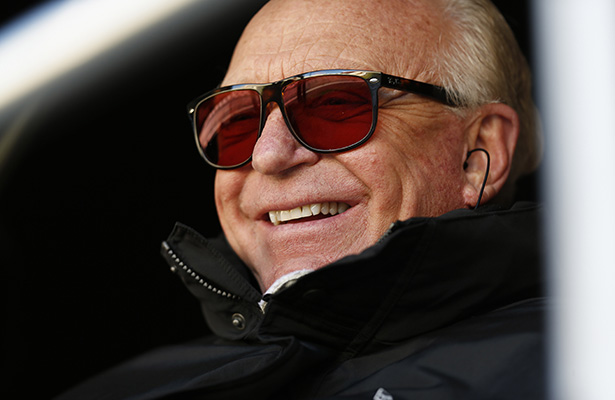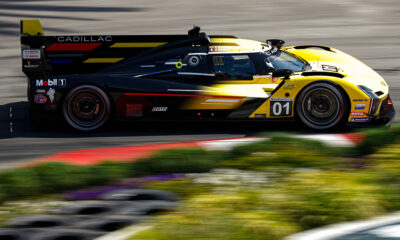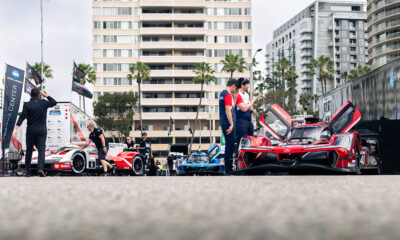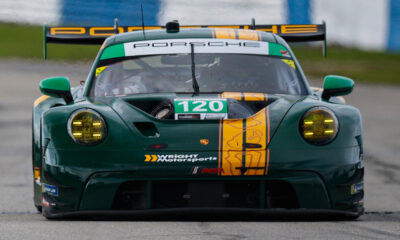
Photo: IMSA
Corvette Racing heads into 2016 following one of its most successful seasons yet, having achieved the triple crown of endurance race victories at the Rolex 24 at Daytona, Twelve Hours of Sebring and 24 Hours of Le Mans.
With updated GTE regulations — including the arrival of turbo-engined cars — a new Balance of Performance process and an evolution in machinery, Sportscar365 caught up with Corvette Racing Program Manager Doug Fehan for a wide-ranging Q&A.
Do you see the new GTE regulations as a big step forward?
“We’ve got some new challenges this year that we never encountered before and that’s the addition of turbo engines. We’ve got a turbo in the Ford, Ferrari and BMW, and we’ll probably have a turbo in the Porsche next year.
“As that has advanced, so has the technology. In my estimation, nobody has ever successfully balanced naturally aspirated and turbo engines competing together. They are affected dramatically different by air restrictors, altitude, relative humidity. It’s a really difficult thing to do.
“However as the engine technology has advanced, so has the electronic technology. The systems that were proposed and have been implemented here, which monitors the turbo engines and controls the boost as a function of the engine RPM, it has the capability of really creating a power curve that closer resembles a naturally aspirated engine.
“I think they’ve had some success in Europe and I believe we’re using essentially the same system here and I think that bodes very well.
“I’m looking forward to seeing how the balance works out. Do I have some reservations? Well of course but I’m sure the turbo guys do too.
“But at the end of the day, this is where we need to be. We can’t continue to operate in a Fred Flintstone world where we’re actually living in a George Jetson age. I welcome all this stuff.”
Do you think there could be a future for a turbocharged Corvette?
“Let’s look at it this way… We’re using a supercharger already in production [Z06], so we’re already there.
“I don’t think there’s any auto manufacturer in the world that has more complete engines sitting on the shelf that they could plug and play, at all different displacements and all different fuel induction systems, both naturally aspirated and turbo or supercharged.
“As you go forward, it’s really silly to say that you’re not going to go to a boosted motor when you already have one. Will it be turbocharged? I don’t know.
“Do we have them? Yeah, you witness that in the Cadillac in World Challenge. We run a twin-turbocharged, small displacement V6. It can make far more horsepower what we’re making here.
“It would be silly to exclude that from happening but not only do I not know about it, but I’m sure the production guys haven’t made any decisions.”
What are your thoughts on the evolution of the GTLM cars, which has seen a trend towards mid-engined layouts?
“I think we’re going to see [an engine placement change] in the Porsche. The history of Porsche is so strong. When you look back at the original Porsches, to the 356 days, there’s still that Porsche family resemblance.
“That has value but at some point, from a technological standpoint, you have to understand that if there’s a better way to do it that would yield a higher performance, you have to go there.
“I think Porsche may be at that crossroads right now. You look at the Cayman and Boxter and look at the driving and handling characteristics of a car that’s not rear-engined. I think they have recognized the time to move the ball down the field. I would expect their new car to not be as rear-engined as this one is.”
Do you support the alleged waivers that Porsche may have secured to re-locate the position of its engine in its 2017 GTE car?
“I don’t know if any of that has been decided yet. When you look at Le Mans, the BMW that races here is not approved to race there.
“I can’t imagine Porsche building and racing something that they can’t race at Le Mans. So there’s no reason to believe that Le Mans is going to change their position on it simply because Porsche’s doing it.
“We can go back to 1997 and 1998 when they built the GT1 car which had no relevance to a road car, other than it looked like a Porsche. That caused the demise of then-GT1 and the LMP class to be born but we already have a LMP class.
“It’s going to be very important if Porsche recognizes that you should race what you build. I think their new car will be reflective of any engine position change. That would be my guess.”
Could we see a mid-engined Corvette racing in the future?
“As far as Corvette is concerned, we’ve made a commitment to run what we sell. To rule out that the engine location would change would be foolish.
“But we have no commitment at all on anything other than our front-engined vehicle. We’ll run what they build. If they decide to build something, you can bet we’ll be racing it.”
Are you in support of IMSA’s new Balance of Performance process?
“I think its a powerfully good move [that the ACO is playing a larger role in IMSA BoP]. Anytime that you can combine technological resources and experiences, I think you get better as a sanctioning body.
“The openness and the willingness of both parties to participate is of key importance here. There’s not reluctance on either side. The FIA/ACO is not reluctant to participate with IMSA and vice-versa.
“When you have two parties that are like-minded like that and they begin to share data and methodology, I think it’s going to be a positive thing.
‘The key to this whole thing is IMSA recognizing that they can do better… and they have. When you recognize where your soft spots are, that’s the first step in getting them fixed. We’ve got that recognition from them and their expressed willingness to improve.
“We’re working with them to try and achieve that. We had a great Windshear wind tunnel test with all the manufacturers. It was a very, very, very productive test. It’s the starting point. Balance of Performance will never be perfect but we know it can be a lot better.”
























